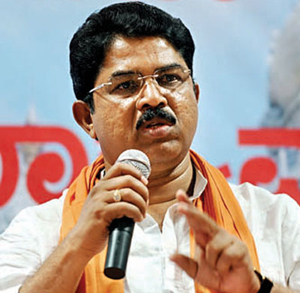Mysuru, Jul 23: Describing the murder of RSS worker Sharath Madivala in Bantwal as politically motivated, BJP leader and former minister R Ashoka has accused Dakshina Kannada in-charge Minister B Ramanath Rai of aiding the killers.
Ashoka, who took part in a protest at Agrahara organised by members of Vishwa Hindu Parishat (VHP) to condemn the murder of Madivala on Saturday, said that killers of Sharath will not surrender if Mr Rai offers special puja to god.
He told reporters that instead of offering pujas, the government should owe responsibility and conduct a thorough investigation into the murder. Rai had offered puja at Rajarajeshwari Temple in Polali, DK district, on Friday.
Ashoka said that the law and order situation had completely collapsed in the state and Congress government had failed to maintain peace.
“The murder of BJP and RSS workers is politically motivated and the state government is targeting the upcoming elections instead of taking suitable action against the culprits. Chief Minister Siddarmaiah is mooting a separate flag for the state to divert people’s attention. The chief minister should convene a meeting with members of all political parties and pro-Kannada organisations to discuss about a flag for Karnataka,” he said.
Ashoka alleged that the CM is indirectly supporting AIADMK leader V Sasikala and is thus providing her VIP treatment in the Bengaluru Central Prisons at Parappana Agrahara.
“Though the dams have not filled, the state government is already releasing water to Tamil Nadu,” he said.





Comments
My number 9108863710 cricket my love my game my life i want life in cricket
Add new comment